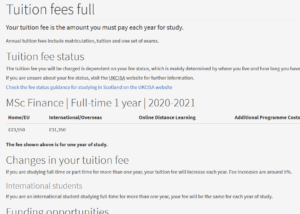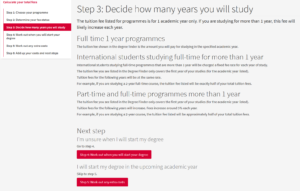Sprint 6 review: Ideating and validating solutions for postgrad fees issues
We’ve focused this sprint on finding solutions to the biggest issues facing prospective postgraduates investigating cost of study, and generating a prototype that’s demonstrably better than current provision.
Sprint focus: Finding ways of helping prospective postgraduates understand what their degree is likely to cost
Dates: 13-19 February (5 working days)
Aims this sprint
We set out this sprint to:
- Understand fully the complexity of postgraduate cost of study, so we could unpick and restructure the essential content
- Dig deeper into our content audit, identifying duplicate and conflicting information across the University’s web estate and map out potential new information architectures
- Clarify terminology, and identify the simplest and most effective way to express things
- Line things up for delivery in future sprints: running more collaborative sessions with colleagues and set up a wiki space to share research and guidance
Progress (and some blockers)
Next sprint, I’m optimistic that this section will be “progress and delivery” but for now we’re still overcoming obstacles to get us to a new publishing model for fees information.
First, the positives…
We split up the priority work (identified through previous user research) with the support of our colleagues in the Fees Services so that we knew what we were looking at this sprint. This then meant we were pushing back the other big chunk of work (establishing fees status) into the next sprint.
Getting time with our colleagues in the Fees Service has been challenging due to the immense workload they operate with, but now that we’ve carved out slots through the week for ongoing collaboration our pace of solutions delivery has significantly picked up.
Solutions design has been a challenging and rewarding experience. We ran a series of co-design ideation sessions within the team to rapidly generate ideas that we could then appraise for feasibility and usefulness.
Our prototyped concepts were designed to gauge student interaction with key information:
- Deposits and application fees that apply to only some programmes
- Presentation of single year fees for the coming year
- Estimating costs for future years (critical for students planning to apply in coming years, or study over multiple years)
We’re working quickly, moving from sketches to layouts in Microsoft Word, to presentation in EdWeb pages on the training server.
The key thing here is that we’re watching students interact with our prototypes each time; we’re seeing what works and what doesn’t and then we’re improving.
What we’re not doing is investing lots of time in polishing new web pages that may look good to the casual viewer, but we can’t be confident actually work for the intended audience.
As Lean UX author Jeff Gothelf advocates, we’re “making learning a first-class citizen of our backlog”. In other words, learning what not to do is just as important as delivering something.
Read about the principles that guide how we work
Make learning a first-class citizen of your backlog.
Jeff Gothelf (Author of Lean UX)
As a result of this approach, we know that our first prototype – while more effective than what is currently live – was a long way from being the clear, easy-to-understand content we need so that students can self serve.

We mocked up Degree Finder content in EdWeb. This early prototype did not achieve what we hoped when we tested it with students. Too many missed critical information.
We pulled our concept apart and tried another approach, retaining all the elements that were working well. This wasn’t a particularly painful process because we had produced the first prototype quickly and cheaply. We did just enough to learn what we needed to proceed.
Our second prototype saw some significant improvements in user behaviour when we tested it. But we’re not there yet.

This revised prototype with significantly cut down text performed better in usability testing, but we still need to refine wording further in the coming sprint.

This prototype page illustrates where we got to at the end of this sprint. The step-by-step guide works better than current provision, but needs refinement.
So we take this prototype and the insight we gained into the next sprint confident we’re on the right path, and in a format we can deliver in EdWeb while removing a lot of ineffective content.
Blockers
So while we saw some great progress which has the team raring to go in the next sprint, we had some challenges which meant we didn’t delivery everything we intended to.
Time with subject matter experts has been at a premium. Because the Fees Team has been so busy, we struggled to get the time we needed to prioritise the work and establish what we were doing this sprint. This meant we started late, and we took the decision to run a shorter sprint rather than move out our subsequent sprint dates. As I mentioned though, we’ve managed to work out a new working pattern with Fees colleagues now which made a real difference to the last few days and gives us greater confidence for the coming two sprints which will also involve them.
We’ve also found it challenging to fully understand how golden copy (tables of fees and search functionality) was integrated into the website, and therefore the dependencies that may restrict some of our potential solutions. Again, this has come down to resource availability in other service areas, but we’ve now got a way forward in terms of collaboration and with our own software developer hopefully joining us in the near future we should be able to mitigate this.
Finally, we’ve been juggling the last stages of the production of the Undergraduate Degree Finder which goes live next week. Little things like Brexit implications for ERASMUS programmes has resulted in us needing to rework content, unfortunately taking time away from our work on fees. Not totally unexpected, but unavoidable unfortunately.
Looking ahead
We kick off Sprint 7 next week, and while more conversations are needed to precisely map out what goes into our next two week to-do list, we know we’re going to be:
- Refining and re-testing our rapidly improving prototype
- Repeating the ideation, prototyping and testing process with fees status information
- Homing in on a new website structure for this improved content
- Bringing in the things we didn’t get to during this sprint – setting up the wiki and booking facilities so we can involve the recruitment and admissions community in reviewing usability testing of our refined prototypes
Track our progress sprint-by-sprint
We’re summarising our work as we go, so everyone knows what we’re doing (and what we’re not).
Read all our sprint review blog posts
If you’ve any questions, get in touch.
Prospective Student Web Content Team contact details




2 replies to “Sprint 6 review: Ideating and validating solutions for postgrad fees issues”